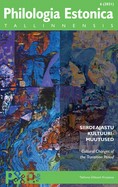Siirdeaegsed valupunktid kirjandusteoste peeglis: Gohar Markosjan-Käsperi romaanid „Penelopa“ ja „Elena“
Pain points of the transition era in the mirror of literary works: Gohar Markosjan-Käsper’s novels „Penelopa“ and „Elena“
Author(s): Aigi HeeroSubject(s): Comparative Study of Literature, Estonian Literature, Post-War period (1950 - 1989), Transformation Period (1990 - 2010), Theory of Literature, Politics of History/Memory
Published by: Tallinna Ülikooli Kirjastus
Keywords: Gohar Markosjan-Käsper; Estonia; Armenia; recent history; Soviet Union; collective memory; transition period; Estonian literature in Russian;
Summary/Abstract: Gohar Markosjan-Käsper (1949–2015), an Armenian-Estonian writer, is generally considered to be a representative of Estonian Russian-language literature. Her novels “Penelopa” (1998) and “Elena” (2000) deal with a period of transition, when the Soviet Union ceased to exist and the construction of a market-oriented society began. The present study analyses how and with what techniques these novels depict the historical events and everyday life in Estonia and Armenia. The article shows how describing the history of Estonia and Armenia with universal, internationally common motives helps to discuss the Soviet legacy and to understand the traumatic experience of transition from one form of society to another. For example, the Soviet occupation in Estonia is explained with the metaphor of domestic violence and the Estonian monetary reform in 1992 is compared to track racing with unequal participants. At the same time, the sometimes differing experiences of the Estonian and Armenian people are compared. The transition period is portrayed as a tough time filled with daily struggle. On the one hand, there are economic and domestic problems; on the other hand, the grief caused by the collapse of a familiar world is addressed. The new era also offers opportunities to speak directly about the traumatic experiences of the past such as World War II. Although several years have passed since the transition, many of the problems of this period have not yet been resolved. These novels show that sometimes there is a way to come to terms with the past with the help of art, literature, and, of course, friends and family. Thus, these books speak not only of sociohistorical pain points, but also of strength, endurance, and wisdom.
Journal: Philologia Estonica Tallinnensis
- Issue Year: 6/2021
- Issue No: 1
- Page Range: 13-35
- Page Count: 23
- Language: Estonian

